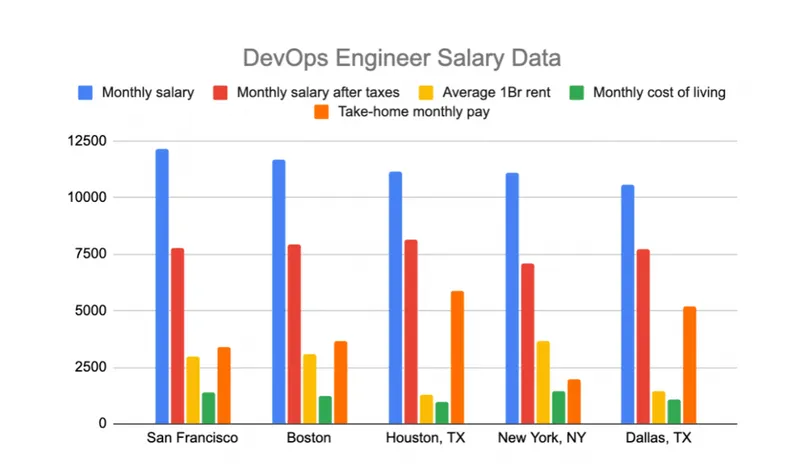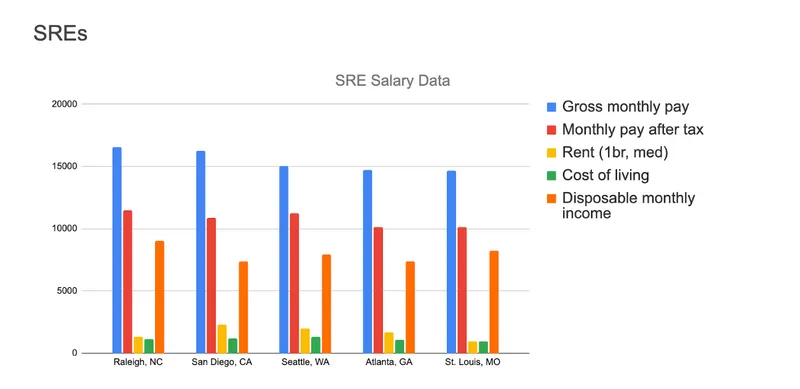To someone who isn’t familiar with these roles, it’s easy to think that DevOps and systems reliability engineers (SREs) might have the same job. After all, both of them involve automation, coding, scaling, and reliability to one degree or another. Both roles are trying to make an organization more efficient. It’s reasonable to wonder if there’s any daylight between DevOps vs SREs.
But these jobs solve subtly different problems. SREs focus on ensuring the reliability and stability of systems and services, while DevOps focus on improving the collaboration and communication between development and operations teams and the speed and efficiency of software delivery.
To provide an analogy, it’s useful to think of SREs as lifeguards of a company. A lifeguard’s main focus is ensuring the safety and stability of the swimming pool, making sure everything runs smoothly, and intervening when necessary. Think of DevOps engineers instead as personal trainers. Personal trainers help their clients reach their goals, improve their performance, and work out efficiently.
In this article, I’ll break down the key differences between DevOps and SRE jobs. We’ll take a look at:
- The main focus of DevOps vs SREs
- Roles and responsibilities
- Skills, background, and education
- Career prospects
- Salaries
The main focus of DevOps vs SREs 🔗
Let’s start by closely looking at what DevOps and SREs focus on.
DevOps engineers improve collaboration and communication between development and operations teams. The ideal outcome of that collaboration is to improve the speed and efficiency of software delivery. To do this, DevOps engineers use automation tools and techniques to manage the software development lifecycle, starting at deployment and continuing through the monitoring stage too.
SREs focus on the reliability and performance of software systems once they’re in production. SREs do use DevOps skills to design, build, and run large-scale, highly available systems, but the goal is to build systems that run smoothly and meet the needs of users.
Can you give me an example? 🔗
Say you’re the owner of an e-commerce shop that sells pens. Both your DevOps engineers and SREs are trying to build an online store that is reliable for your customers.
Your DevOps engineer would prioritize the software delivery system. For example, say your software engineers make the search algorithm better so customers can easily find fancy fountain pens in the color they want. The DevOps team would run tests to make sure it was working as intended, and deploy it to production as soon as possible. As a DevOps engineer, you want to make sure those changes are going to be available to customers ASAP, and working well enough to be usable on day one.
Once that change is in production, that’s when your SREs would come in. They make sure that deployment was stable and reliable. For example, an SRE might simulate a massive traffic spike to see if that new feature could handle a flood of customers if your fancy fountain pens went viral on TikTok.
That’s just one example, but in short, DevOps roles focus on making the software delivery cycle more efficient. SREs make sure that system is stable and reliable.
Roles and responsibilities of DevOps and SREs 🔗
Now that you understand the focus of each of these job roles, let’s see how that primary focus breaks down into the main roles and responsibilities of each job.
DevOps engineers mainly are in charge of implementing and maintaining tools and processes that support collaboration and communication, CI/CD, and configuration management.
SREs work on the design, development, and maintenance of systems and services that meet specific reliability and availability goals, automated monitoring, incident response, and incident management.
A couple of real-life examples of DevOps and SRE jobs 🔗
Let’s take a look at a few real-life job postings at Google to get a better sense of the roles and responsibilities of DevOps vs SREs.
Quick note: Google is a cloud-based organization, so a lot of their DevOps roles are, by necessity, cloud engineers. I explained the difference between DevOps engineers vs cloud engineers here, but it boils down to the fact that they do the same thing, but one works with cloud-based architecture instead. For the sake of keeping things simple, I’ll still refer to this Google cloud engineer job as a DevOps engineer.
Showing a real-life example will also demonstrate that no two DevOps or SRE jobs are alike. This particular DevOps role at Google is unusually customer-facing, while the SRE job is more standard.
The roles and responsibilities of a DevOps engineer at Google:
As a DevOps engineer at Google, you’ll be expected to:
- Be customer-facing. You’re working with customers to design cloud-based architecture
- Support customer implementations of cloud architecture technology
- Consult with customers on CI/CD, pipeline development, data migration, troubleshooting, and monitoring
The roles and responsibilities of an SRE at Google
As an SRE, you’ll be expected to:
- Build and run large-scale, massively distributed, fault-tolerant systems
- Improve the whole lifecycle of services from inception and design, through deployment, operation, and refinement
- Eliminate work using automation
- Maintain live services by measuring and monitoring availability, latency, and overall system health.
- When things go wrong, you’ll lead sustainable incident response and blameless postmortems
This hopefully illustrates the key difference between DevOps and SREs: it’s about when you go in. DevOps are more focused on building, while SREs work more on reliability and scaling once something is live.
It’s worth pointing out that there’s enough overlap between these two roles that employers will often ask you to do both. For example, here’s a DevOps job opening that asks for you to take on SRE initiatives, too.

Source: Labviva’s careers page
Skills, background, and education 🔗
What skills, background, and education do you need to get a job as either a DevOps engineer or an SRE?
In summary, DevOps need a strong knowledge of tools such as Jenkins, Ansible, and Kubernetes, experience with programming languages such as Python and JavaScript, and an understanding of Agile methodologies and cloud computing. SREs require expertise with Linux/Unix, experience with programming languages such as Python, Go, and Shell scripting, and an understanding of distributed systems and network protocols.
Both roles require a background in software engineering and systems admin. And finally, both roles require a Bachelor’s in Computer Science or equivalent work experience.
That’s a lot of buzzwords, so let’s break it down by skills, background, and education in some handy charts, similar to the ones I created for DevOps versus DevSecOps.
Skills 🔗
| DevOps | SRE |
|---|---|
| Automation tools (Ansible, Chef, Puppet) | Automation tools (Ansible, Chef, Puppet) |
| Containerization/orchestration (Docker, K8s) | Containerization/orchestration (Docker, K8s) |
| Cloud platforms like AWS, Azure, GCP | Cloud platforms like AWS, Azure, GCP |
| Monitoring and logging tools (Prometheus, Grafana) | Monitoring and logging tools (Prometheus, Grafana) |
| CI/CD tools (Jenkins) | CI/CD tools (Jenkins) |
| Scripting/programming | Scripting/programming |
| Linux/Unix admin skills | Linux/Unix admin skills |
| Communication, collaboration | Communication, collaboration |
| Problem-solving, analytical thinking | Problem-solving, analytical thinking |
| * | Version control (Git) |
| * | Incident response and management |
| * | Capacity planning and load testing |
| * | Security best practices and hardening |
Background 🔗
| DevOps | SREs |
|---|---|
| Software engineering | Software engineering |
| System administration | System administration |
| IT Operations | Network administration |
Education 🔗
| DevOps | SREs |
|---|---|
| BA in CS, software engineering, or related | BA in Computer Science, software engineering, or related |
| * | Ideally, a Masters in Computer Science or Engineering |
| Or equivalent work experience | Or equivalent work experience |
As you can see, there’s a lot of overlap. The same skills are used in different ways, and SREs also need some more skills in dealing with things going wrong.
From a background perspective, there’s again a lot of overlap. This really highlights how the same background can be used to get you a job in either role.
Finally, the main difference in education is that many SRE jobs will prefer further education.
Let’s give a bit more context to those charts.
Skills of a DevOps engineer vs an SRE 🔗
I outlined the main skills needed for a DevOps engineer in my DevOps vs DevSecOps article, so I’ll reproduce that section here:
- Automation: Experience with automation tools such as Ansible, Chef, or Puppet. Understand infrastructure as code and have the ability to automate provisioning, configuration, and management of servers and other infrastructure. If you’re going into the SRE field, you’ll also want knowledge of incident management and response.
- Containerization and orchestration: Knowledge of containerization and orchestration technologies like Docker and Kubernetes, Mesosphere, or Docker Swarm.
- Cloud: Understand cloud-native architecture and be able to design, build, and manage cloud-based systems like AWS, Azure, or GCP.
- Monitoring and logging: Know how to collect, analyze, and act on log data to improve system performance and troubleshoot issues using monitoring and logging tools like Prometheus, Grafana, or Elasticsearch.
- CI/CD: Experience with CI/CD tools like Jenkins, Travis CI, or CircleCI. Understand how to automate the building, testing, and deployment of code.
- Scripting and programming: Understand how to write scripts and code to automate tasks and improve system efficiency. Python is a good language to know here.
- Linux/Unix administration: Understand how to manage and troubleshoot Linux/Unix-based systems.
- Networking: Strong understanding of networking concepts, including IP addresses, DNS, load balancing, and firewalls.
- Troubleshooting and problem-solving: Understand how to identify and solve problems quickly and effectively.
- Communication: Strong communication skills to effectively collaborate with cross-functional teams and stakeholders.
Then if you want to be an SRE, you’ll also need:
- Version control: Use tools like Git to track changes and collaborate with others on a project.
- Incident response and management: Quickly identify and assess incidents, and develop and implement plans to resolve them.
- Capacity planning and load testing: Forecast future needs and simulate real-world usage of the system to make sure the performance of the system in production will work as expected.
- Security best practices and hardening: secure the system by reducing its attack surface and implementing security controls
Background of a DevOps engineer vs an SRE 🔗
The backgrounds are very similar, as I noted. Both jobs basically want you to prove that you’ve got software engineering skills and you know your way around systems.
The main difference is that as an SRE, most jobs will want you to show off a deeper, richer background, ideally with some networking components as well. (This requirement is bolstered by a higher paycheck, as we’ll get into below!)
Education of a DevOps engineer vs an SRE 🔗
There’s not much to add to the chart I produced above. It’s worth noting that the educational requirements are pretty flexible – most job openings make a point of saying that they’ll accept work experience in place of degrees.
If you want to get either job but didn’t get a degree in the right field, hope is not lost. You can bulk out your software engineering portfolio with some backend projects, show off your skills in languages like Python and Go, and think about getting a certification or two.
Career prospects 🔗
The fact that you don’t really need a degree to get either of these jobs should give away one important fact: the career prospects for both DevOps and SREs are absolutely booming.
There’s an extremely high demand for both DevOps and SRE professionals in various industries, such as software development, IT, e-commerce, and finance.
Let’s use another chart to compare the numbers:
| Platform | DevOps | DevSecOps |
|---|---|---|
| 175k job openings available | 65k job openings available | |
| Indeed | 8,355 job openings available | 4,605 job openings available |
| Glassdoor | 4,298 job openings available | 1,704 job openings available |
These are accurate as I write this article.
You can see that numbers for SRE jobs are consistently lower across all three platforms, but they’re still high. However, thanks to the huge amount of overlap between the two roles, you can easily switch between the two.
If you have the background and skills to be an SRE, you’d likely be able to apply to a DevOps job and use your skills to negotiate for a higher salary.
If you’re looking to angle into the SRE role and you’re currently in the DevOps realm, I’d recommend taking on additional responsibilities in your current role. Volunteer to take on some incident response and management duties. Learn a bit about how the current team makes sure code in production is stable and hardened.
Your current employer will likely be grateful, and you can use those newfound skills to transition into an SRE role either there or elsewhere.
Salaries 🔗
It’s all about the money, isn’t it? Either as a DevOps engineer or as an SRE, you’ll get a generous salary. High demand, remember?
However, the additional skills and specialties of an SRE command a higher price tag.
The average salary of a DevOps in the US is around $120k according to Indeed. You can expect to earn at least $80k if you’re on the low end, but up to $175k if you’re more experienced.
The average salary of an SRE is around $162k according to Indeed. On the high end, SREs earn over $300k! The low end is close to DevOps salaries, only $82k.
However, it really depends on where you live, too. As I’ve noted in previous articles, if you’re a DevOps in New York, for example, rent and cost of living are so high that you don’t take much home, even if you’re taking home north of 100k.
That’s why it’s useful to look at the take-home pay in the top five cities to really get an understanding of what those salary numbers mean.
DevOps 🔗
| City | Monthly salary | Monthly salary after taxes | Average 1Br rent | Monthly cost of living | Take-home monthly pay |
|---|---|---|---|---|---|
| San Francisco | 12,169.50 | 7,747 | 2,995 | 1,369.40 | 3,382.60 |
| Boston | 11,682.75 | 7,941 | 3,070 | 1,212.40 | 3,658.60 |
| Houston, TX | 11,159.75 | 8,141 | 1,303 | 962.50 | 5,875.50 |
| New York, NY | 11,113.83 | 7,092 | 3,680 | 1,437.10 | 1,974.90 |
| Dallas, TX | 10,566.83 | 7,736 | 1,450 | 1,103.90 | 5,182.10 |
And here are those numbers in a handy chart:

This illustrates my point so well: In San Francisco, you do earn the highest gross income. But Houston and Dallas are actually best in terms of take-home money. In a place like New York, you would only take home $2k every month after taxes, rent, and regular expenses.
Let’s compare that with an SRE salary.
SREs 🔗

Interestingly, the places with the highest SRE salaries are (unusually) not the same places where the cost of living seems to be out of control, like Boston, NYC, or San Francisco. In Raleigh, NC, SREs command an average salary of nearly $200k. And there, you can expect to keep nearly $10k per month after taxes, rent, and monthly expenses like eating and shopping. Not too bad!
What is the difference between DevOps vs SREs? 🔗
Let’s bring it all home with a brief summary.
To start, what do the jobs have in common? Both jobs require computer science, software engineering, and systems administration backgrounds. Both are highly technical, and both offer very generous compensation. As both an SRE and a DevOps engineer, you can expect to be able to get a job without any job security issues.
Now onto the differences. SREs need to do everything DevOps can do. They need more experience or education. Finally, SREs focus more on post-production reliability and scaling, whereas DevOps focus more on getting code into production as efficiently as possible.
Hopefully, this guide has clarified the subtle differences between the two roles. As either a DevOps engineer or as an SRE, you’ll find the job fulfilling, interesting, and reliable.




